The AMD Zen and Ryzen 7 Review: A Deep Dive on 1800X, 1700X and 1700
by Ian Cutress on March 2, 2017 9:00 AM ESTBenchmarking Performance: CPU Encoding Tests
One of the interesting elements on modern processors is encoding performance. This includes encryption/decryption, as well as video transcoding from one video format to another. In the encrypt/decrypt scenario, this remains pertinent to on-the-fly encryption of sensitive data - a process by which more modern devices are leaning to for software security. Video transcoding as a tool to adjust the quality, file size and resolution of a video file has boomed in recent years, such as providing the optimum video for devices before consumption, or for game streamers who are wanting to upload the output from their video camera in real-time. As we move into live 3D video, this task will only get more strenuous, and it turns out that the performance of certain algorithms is a function of the input/output of the content.
7-Zip
One of the freeware compression tools that offers good scaling performance between processors is 7-Zip. It runs under an open-source licence, is fast, and easy to use tool for power users. We run the benchmark mode via the command line for four loops and take the output score.
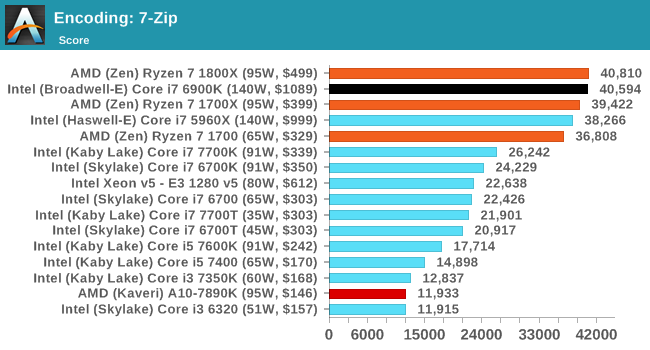
WinRAR 5.40
For the 2017 test suite, we move to the latest version of WinRAR in our compression test. WinRAR in some quarters is more user friendly that 7-Zip, hence its inclusion. Rather than use a benchmark mode as we did with 7-Zip, here we take a set of files representative of a generic stack (33 video files in 1.37 GB, 2834 smaller website files in 370 folders in 150 MB) of compressible and incompressible formats. The results shown are the time taken to encode the file. Due to DRAM caching, we run the test 10 times and take the average of the last five runs when the benchmark is in a steady state.
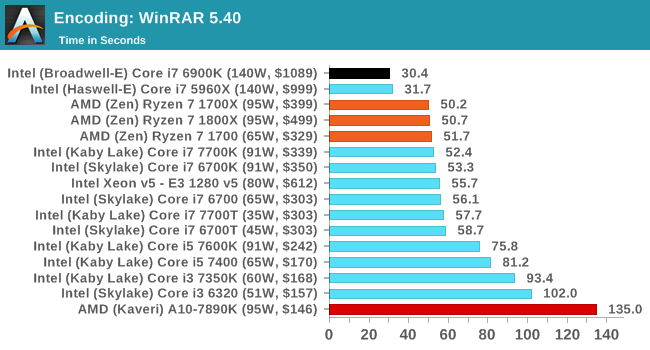
AES Encoding
Algorithms using AES coding have spread far and wide as a ubiquitous tool for encryption. Again, this is another CPU limited test, and modern CPUs have special AES pathways to accelerate their performance. We often see scaling in both frequency and cores with this benchmark. We use the latest version of TrueCrypt and run its benchmark mode over 1GB of in-DRAM data. Results shown are the GB/s average of encryption and decryption.
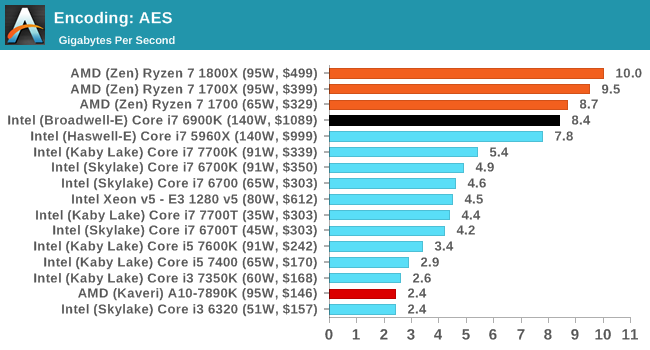
HandBrake H264 and HEVC
As mentioned above, video transcoding (both encode and decode) is a hot topic in performance metrics as more and more content is being created. First consideration is the standard in which the video is encoded, which can be lossless or lossy, trade performance for file-size, trade quality for file-size, or all of the above can increase encoding rates to help accelerate decoding rates. Alongside Google's favorite codec, VP9, there are two others that are taking hold: H264, the older codec, is practically everywhere and is designed to be optimized for 1080p video, and HEVC (or H265) that is aimed to provide the same quality as H264 but at a lower file-size (or better quality for the same size). HEVC is important as 4K is streamed over the air, meaning less bits need to be transferred for the same quality content.
Handbrake is a favored tool for transcoding, and so our test regime takes care of three areas.
Low Quality/Resolution H264: He we transcode a 640x266 H264 rip of a 2 hour film, and change the encoding from Main profile to High profile, using the very-fast preset.
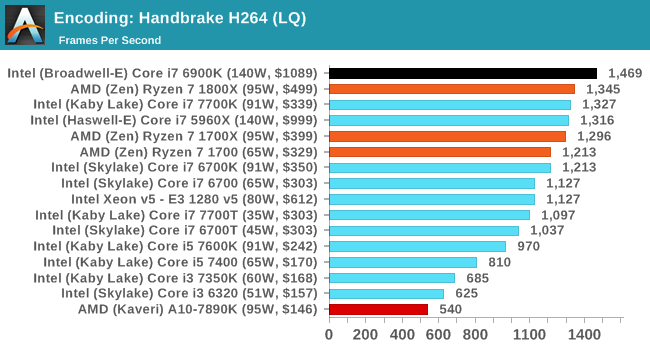
High Quality/Resolution H264: A similar test, but this time we take a ten-minute double 4K (3840x4320) file running at 60 Hz and transcode from Main to High, using the very-fast preset.
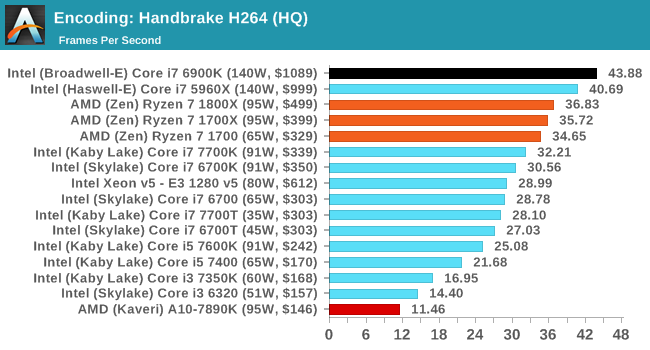
HEVC Test: Using the same video in HQ, we change the resolution and codec of the original video from 4K60 in H264 into 1080p30 HEVC. This causes a dramatic reduction in filesize.
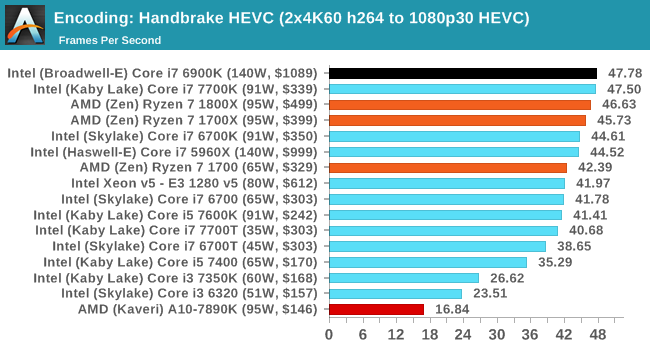










574 Comments
View All Comments
BurntMyBacon - Friday, March 3, 2017 - link
@Gothmoth: "gamer... as if the world is only full with idiotic people who waste their lives playing shooter or RPG´s."PC Gaming happens to be one of the few growing areas in the PC market. Not everyone games, but for those that do, the 7700K is still worth considering. Dropping $500 on the 1800X may not be the best call for those that don't take advantage of the parallelism. Of course, the 1800X wasn't really meant for people who can't take advantage of the parallelism. AMD will have lower cost narrower processors to address that gap. I'm curious as to how the performance/price equation will stand once AMD releases their upper end 6c/12t and 4c/8t processors.
Beany2013 - Friday, March 3, 2017 - link
Sod the 1800X - I need a new VM server, and if I want all the threads (sixteen), I can either drop £450 on a Xeon E5 2620 at 2.1-3ghz (cheapest Intel 16 thread option I can find), or I can spend £100 less, and get a Ryzen 7 1700 (3.0-3.7ghz) and put that extra money towards more RAM so I can run more VMs and get more work done.For those of us who aren't high end gamers - which is basically almost everyone, and a far more significant market - these chips may well give Intel a bloody nose in the workstation space; AMD have confirmed they'll use ECC RAM quite happily.
Photographers, videographers, CAD-CAM, developers etc are a bigger market in terms of raw units than high end gamers, and these chips look like being a pretty compelling option as it stands.
Steven R
Beany2013 - Friday, March 3, 2017 - link
(VM server for home, I should have noted - for work, I'll see how the Ryzen based opterons and supermicro mobos etc pan out - money is important in these factors, but I'm not a moron, and I'm not going to run production gear on gaming hardware, natch....)BurntMyBacon - Friday, March 3, 2017 - link
@Beany2013: "I need a new VM server, and if I want all the threads (sixteen), I can either drop £450 on a Xeon E5 2620 at 2.1-3ghz (cheapest Intel 16 thread option I can find), or I can spend £100 less, and get a Ryzen 7 1700 (3.0-3.7ghz) and put that extra money towards more RAM so I can run more VMs and get more work done."It is clear by this statement that you fall into the category of people that can take advantage of the parallelism. Therefore, my statement doesn't apply to your presented in the slightest.
I don't disagree that the Ryzen 7 series has a lot to offer to a lot of people (myself included). If I were in the market today, I'd be looking long and hard at an R7 1700X. The minor drop in gaming performance is less significant to me than the increase in performance for many other tasks I use my computer for. I do a little bit of dabbling in a lot of different things (most of which benefit from high thread count). I have noticed that for the set of applications I have open simultaneously and the tasks I have running, my computer is more responsive with more cores or threads, but single threaded performance is still important to the individual tasks.
In my workflow: (i3 < i5/FX-8xxx < i7 <? R7)
My point was that there is in fact a not so insignificant market of people putting computers together for the primary purpose of gaming. This market appears, by all metrics, to be growing. For this market, Intel's i7-7700K or better yet i5-7600K are still viable options that provide better performance/price than AMD's current options. I'll repeat: "AMD will have lower cost narrower processors to address that gap. I'm curious as to how the performance/price equation will stand once AMD releases their upper end 6c/12t and 4c/8t processors."
Cooe - Sunday, February 28, 2021 - link
"or better yet i5-7600K"Arguably the most short-sited statement in this entire comments section lol. The 4c/4t i5's had roughly equal gaming performance to Ryzen at launch but with ZERO headroom left for the future. This is why the i5-7600K gets absolutely freaking ROFLSTOMPED by the R5 1600 in modern titles/game engines.
JMB1897 - Friday, March 3, 2017 - link
Compelling, but I don't think it's totally there yet. I'd be worried about the memory issues. Increased latency as you add more DIMMs and dual vs quad channel. I'd spend that extra 100 on a Xeon personally.Sttm - Friday, March 3, 2017 - link
Thats who buys off the shelf CPUs thats cost $$$, Gamers. Thats who AMD needs to please with their product. GAMERS. Thats why AMD's stock has been tanking since Ryzen reviews went up, because GAMERS are the demographic that matters when it comes to performance CPU sales.deltaFx2 - Saturday, March 4, 2017 - link
@Sttm: You have an inflated opinion of the impact of gamers. No, AMD's stock isn't tanking because of gamers. I suggest you also look at Nvidia's stock, which is well down from its high of ~120, to ~98. Wed-Friday, Nvidia dropped from 105 to 98, and it dipped below that to ~96 at one point. That's roughly 7-8%. The two stocks are often correlated on drops, with AMD amplifying nvidia's drop. Both do GPUs, see? Some people make tonnes of money shorting AMD (and in recent times have lost their shirt doing so).Here's the truth: All Desktop, as per Lisa Su, is a 5 bn TAM market and gaming is part of this (let's say 50%). Nothing to scoff at, sure, but compared to laptop and server, it's a rounding error. There's NOTHING in these tests/reviews to suggest that AMD will suck in those markets; in fact, quite the opposite: power looks good, perf looks good. AMD's stock (long term) won't tank on the whims of gamers. They help get the mindshare, which is the only reason they're worth catering to (they tend to be a vocal, passionate, and sometimes irrational lot. You won't see datacenter gurus doing the stuff that gamers do. They certainly won't shoot each other over whose GPU is the best).
cmdrdredd - Saturday, March 4, 2017 - link
Believe it or not there are millions of people worldwide who pretty much use their PC for two things. The internet (web browsing, email etc) and gaming. You don't need 16 threads to check email and read forums either so gaming performance is going to be critical. It's not just the CPU performance, it's the entire platform that contributes to Gaming related performance.sans - Thursday, March 2, 2017 - link
Yeah, stick with Intel because Intel is the standard and its products are the best for each respective market. AMD is a total failure.